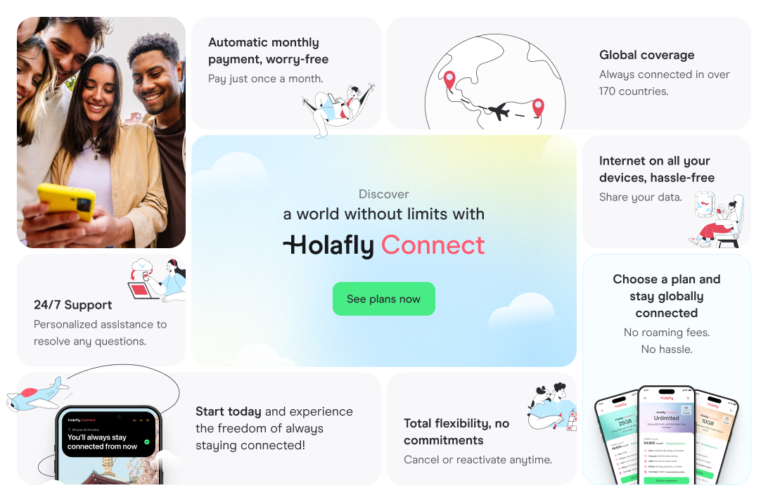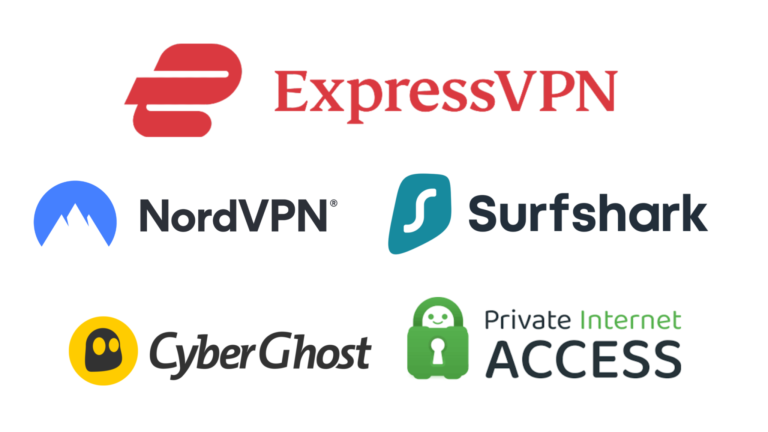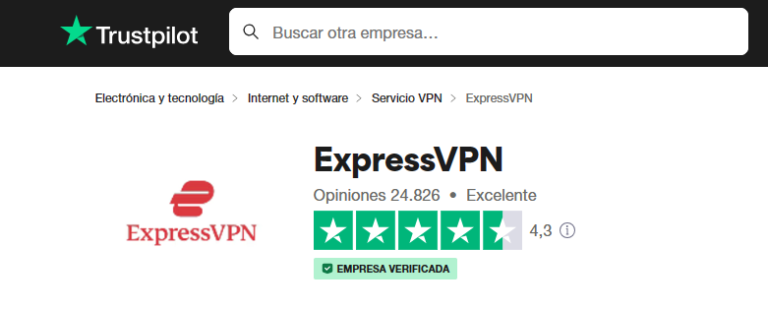Best VPN for Digital Nomads: How to Choose the Ideal for You?
We recommend the best VPNs for digital nomads and what they offer: upload speed, countries of coverage, prices and more.
The lifestyle of a digital nomad combines work and travel, which generates the need to stay connected and secure while surfing potentially insecure networks. In this context, choosing the best VPN for digital nomads is a fundamental decision, since a VPN helps to improve security and privacy when connecting to the Internet.
At Holafly we care about the security of our travelers, which is why we have prepared this article to guide you on the best VPN options for digital nomads, the use and importance of this resource when traveling to a country with cyber restrictions.
Plans that may interest you
What is a VPN?
A VPN (Virtual Private Network) is a powerful tool for safer internet browsing. It creates an encrypted “tunnel” between your device and a VPN server, ensuring your data is routed through the server rather than directly to websites. This process hides your IP address and safeguards your information from potential threats. For digital nomads frequently using public Wi-Fi, where data is more vulnerable, a VPN is invaluable. It enhances your online privacy and protects your personal information, keeping your connection secure wherever you go.
Why use a VPN when living as a digital nomad?
According to a Norton report on consumer cybersecurity, more than 1.5 billion cyber frauds were blocked in 2023 in the first half of the year. When traveling and working from different locations, exposure to public Wi-Fi networks increases, and with it, the risk of cyber attacks. Here we explain the main reasons why digital nomads should consider using a VPN in their lifestyle.
1. Security on public networks
When you work from coffee shops, hotels or coworking spaces, you often connect to public Wi-Fi networks. These networks are vulnerable to cyber attacks, such as the theft of personal information. A VPN encrypts your connection, ensuring that your data remains private and protected from potential threats.
2. Access to geo-blocked content
According to a Freedom House report in 2023, access to the Internet without VPN is geographically restricted in several countries. About 60 nations impose some form of censorship or blocking. Digital nomads need access to content specific to their home country, such as streaming services or work platforms. A VPN allows you to change your virtual location, facilitating access to this restricted content.

3. Privacy and anonymity
Online privacy is a growing concern. A Pew Research Center study found that 79% of Americans are concerned about how companies handle their personal information. Using a VPN helps hide your online activity from Internet Service Providers (ISPs) and potential hackers. This is relevant for those who handle sensitive or personal information at work.
4. More stable connections
Certain VPN services can offer more stable and faster connections by redirecting your traffic through optimized servers. This is valuable in regions where the quality of the internet connection is inconsistent, as a good VPN can improve loading speed. For digital nomads, having a reliable connection is necessary to perform work tasks, attend video conferences or download files without interruptions, allowing them to work more efficiently, no matter where they are.
Important: If you are a frequent traveler and want to stay connected without worrying about expensive roaming or looking for a new SIM at every destination, Holafly’s subscription plans are for you. With a single eSIM, enjoy internet in more than 170 countries for a fixed price and no surprises on your bill. travel without limits and connect easily and securely! 🚀🌍

Comparison of the 10 best VPNs for digital nomads
Selecting the best VPN for working as a digital nomad can seem like a complicated challenge. In the following table we share relevant information on ten VPN services for digital nomads.
You will be able to compare important data such as the impact on the reduction of your internet speed (i.e., how much slower the internet becomes when using the VPN), the number of servers (in how many countries), simultaneous connections (for various devices) and the price.
Evaluating these aspects will help you find the most suitable option for your needs as a digital nomad, ensuring that you can work and surf safely and efficiently while traveling.
| VPN | Change of location | Simultaneous connections | Impact on the reduction of the original speed | Supported protocols | Price in dollars |
| ExpressVPN | 105 countries | 8 | 5% | Lightway, OpenVPN, IKEv2 | $6.67/month |
| NordVPN | 60 countries | 6 | 10% | OpenVPN, IKEv2 | $3.42/month |
| Surfshark | 65 countries | Unlimited | 7% | OpenVPN, IKEv2 | $2.49/month |
| CyberGhost | 91 countries | 7 | 6% | OpenVPN, IKEv2 | $2.25/month |
| Private Internet Access (PIA) | 84 countries | 10 | 4% | OpenVPN, IKEv2 | $2.85/month |
| IPVanish | 75 countries | Unlimited | 5% | OpenVPN, IKEv2 | $3.49/month |
| VyprVPN | 70 countries | 5 | 8% | Chameleon, OpenVPN | $2.50/month |
| ProtonVPN | 60 countries | 10 | 6% | OpenVPN, IKEv2 | $4/month |
| TunnelBear | 46 countries | 5 | 9% | OpenVPN | $3.33/month |
| Windscribe | 63 countries | 10 | 5% | OpenVPN, IKEv2 | $4.08/month |
Top 5 best VPNs for digital nomads
We have made a selection of the five best VPNs for digital nomads that we will analyze in more depth, because they stand out for their exceptional features in speed, robust security and superior performance. At Holafly, we want to help you choose the right one for your digital nomad lifestyle.

1. ExpressVPN
ExpressVPN stands out as one of the most recognized options in the VPN market for digital nomads who require global connectivity. With an impressive network of more than 3,000 servers in 105 countries, it provides the flexibility needed to surf without restrictions wherever you go. Its innovative Lightway protocol ensures a fast connection and prioritizes security, allowing a minimum reduction in speed of only 5% less than the original browsing. Here are its features:
- Encryption: AES-256, the industry standard for strong protection.
- Protocols: Offers multiple options such as Lightway, OpenVPN and IKEv2, adapting to various needs.
- Performance: Speed is hardly affected, maintaining a smooth user experience.
- Plans and pricing: Starting at $6.67 per month, an “expensive” option for many.
- Compatibility: Works on a wide range of platforms, including Windows, macOS, Linux, iOS and Android.
- Cybersecurity awards: It has received several mentions in specialized magazines such as PCMag and TechRadar, recognizing its commitment to security since 2020.
- Data policy: Its external audit conducted by PwC reinforces its reputation for transparency and trust.
| Advantages | Disadvantages |
| – Excellent 24/7 customer support. – Additional features such as a kill switch, which automatically cuts off your Internet connection if the VPN disconnects. This prevents your real IP address and data from being exposed on unsecured networks. – 30-day money back guarantee. | – Plans are slightly more expensive than other options. |
2. NordVPN
NordVPN is one of the most respected VPNs on the market, known for its strong commitment to privacy and security. With more than 5,400 servers in 60 countries, it is perfect for digital nomads looking for global connectivity without compromising their security. Its no logs policy, among other features, ensures that your online activities remain private.
- Encryption: AES-256, guaranteeing a robust level of protection against cyber threats.
- Protocols: Offers options such as OpenVPN, IKEv2 and NordLynx, adapting to different security and performance needs.
- Performance: Maintains a 10% speed impact, resulting in fast and efficient browsing.
- Plans and pricing: Start as low as $3.42 per month, making it an affordable option.
- Compatibility: Works on various platforms: Windows, macOS, Linux, iOS and Android.
- Cybersecurity awards: Has been recognized with the “Best VPN” award at the 2021 Cybersecurity Excellence Awards, highlighting its excellence in data protection.
- Data policy: Independently audited, consolidating its transparency and reliability.
| Advantages | Disadvantages |
| – Double VPN functions: Increases security by encrypting your data twice. – Protection against malware: Includes tools to protect you from online threats. – Excellent customer service: 24/7 support available, ideal for resolving doubts quickly and efficiently. | – Somewhat complex interface: May be a bit intimidating for beginners. – Fluctuations in speed: Some servers may have variations in speed. |
3. Surfshark
This VPN for digital nomads presents itself as an affordable and versatile option in the world of VPNs, excellent for people who require unlimited simultaneous connections. With more than 3,200 servers in 65 countries, it allows users to enjoy unlimited browsing on multiple devices, whether on laptops, smartphones or tablets. Among the qualities for which it stands out, we can mention:
- Encryption: Uses AES-256, ensuring that your data is always protected.
- Protocols: Supports OpenVPN and IKEv2, guaranteeing a secure and fast connection experience.
- Performance: With a 7% speed impact, it offers efficient browsing without sacrificing security.
- Plans and pricing: Starts from $2.49 per month, making it one of the cheapest options on the market.
- Compatibility: Works on Windows, macOS, Linux, iOS and Android, allowing it to be used on a wide range of devices.
- Cybersecurity awards: It has received several mentions in cybersecurity reviews, including TechRadar’s recognition as “Cheapest VPN ” in 2024.
- Data policy: Does not keep logs, ensuring user privacy.
| Advantages | Disadvantages |
| – Additional features: Includes an ad blocker, enhancing the browsing experience. – 30-day refund policy: Allows you to try the service risk-free. – 24/7 support: Customer support available at any time, ideal for quick resolution of queries. | – Inconsistent speed: Some servers may have fluctuations in speed. – Fewer servers: Compared to market leaders, their number of servers is limited. |
4. CyberGhost
CyberGhost stands out for its focus on ease of use and a smooth user experience. With more than 7,000 servers in 91 countries, it is an exceptional option for those looking for a VPN that combines simplicity and effectiveness. This platform is preferred by digital nomads who want to connect quickly without complications. Let’s evaluate its particularities:
- Encryption: Uses AES-256, ensuring that your information remains protected against threats.
- Protocols: Supports OpenVPN and IKEv2, guaranteeing secure and fast connections.
- Performance: With a speed impact of 6%, it offers an efficient browsing experience.
- Plans and prices: Starting at $2.25 per month, it is one of the most affordable options on the market.
- Compatibility: Works on Windows, macOS, Linux, iOS and Android, allowing its use on various devices.
- Cybersecurity awards: It has received positive recognition in 2022 by experts from TechRadar and CNET, highlighting its commitment to user privacy.
- Data policy: Does not keep logs, reinforcing its focus on data protection.
| Advantages | Disadvantages |
| – Intuitive interface: Designed for ease of use, even for beginners. – Additional security features: Includes malware protection, enhancing your online security. – 45-day money back guarantee: Allows you to try the service risk-free, giving you peace of mind. | – Customer support: Can be slow at peak times, which could be inconvenient if you need urgent help. – Heavy application on older devices: The application may consume resources, affecting its performance on older equipment. |
5. Private Internet Access (PIA)
Private Internet Access, or PIA, is known for its focus on flexibility and customization, which makes it an excellent VPN option for digital nomads who want to adjust their configuration according to their specific needs. With more than 3,300 servers in 84 countries, PIA offers extensive global coverage and the ability to tailor your browsing experience. Specifically, it offers you:
- Encryption: Uses AES-256, guaranteeing maximum security for your personal data.
- Protocols: Supports OpenVPN and IKEv2, ensuring robust and reliable connections.
- Performance: Has a speed impact of 4%, maintaining an efficient browsing experience.
- Plans and pricing: Starting at $2.85 per month, it is an economical option for those looking for customization.
- Compatibility: Works on Windows, macOS, Linux, iOS and Android, offering versatility on multiple devices.
- Cybersecurity awards: Has received accolades in technology forums and was featured in PCMag in 2021 for its focus on privacy and security.
- Data policy: Does not keep logs, prioritizing its commitment to user privacy.
| Advantages | Disadvantages |
| – High customization: Allows you to adjust security settings to suit your specific needs. – Anonymous payment options: Facilitates payment methods that protect your identity. – Malware protection tools: Includes additional features to enhance your online security. | – Complicated interface for beginners: Can be intimidating for those unfamiliar with technical configurations. – Slower speed than some competitors: May not be as fast as other VPNs for digital nomads on the market. |
What is the best VPN for digital nomads?
After evaluating the aforementioned options, ExpressVPN emerges as the best VPN for digital nomads at present. Thanks to its better performance in speed, security, ease of use and a wide network of servers around the world, it becomes the most recommended option for those who work while traveling. Currently, it is positioned as one of the best VPN services on Trustpilot. With a score of 4.3 stars and more than 20,000 user recommendations that endorse its excellent customer service and privacy policies. It will undoubtedly give you the peace of mind of having support and security wherever you go and will make a significant difference in your experience as a digital nomad.

Frequently asked questions about the best VPNs for digital nomads
A VPN (Virtual Private Network) encrypts your Internet connection, protecting your data and allowing you to access geographically restricted content while traveling.
Yes, using a VPN can slow down your connection speed. But some VPNs, such as ExpressVPN, have a minimal impact, while others can be slower.
Most VPNs allow multiple simultaneous connections. For example, Surfshark offers unlimited connections, which is ideal for nomads with multiple devices.
The legality of VPNs varies from country to country. In most places they are legal, but there are countries such as China and Russia where their use is restricted or prohibited.
Consider factors such as number of servers, speed, privacy policy, cost and ease of use to find the VPN that best suits your lifestyle.
Not necessarily. Most VPNs have intuitive interfaces and installation guides, allowing inexperienced users to set them up easily.
Yes, by encrypting your connection, a VPN protects your data from possible attacks on public Wi-Fi networks, helping to keep your personal information secure.





 Language
Language 


















 No results found
No results found













